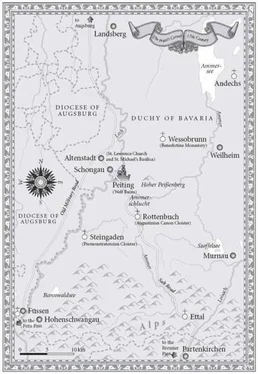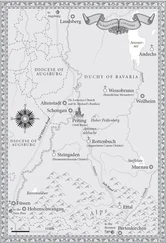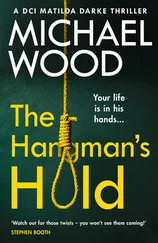Oliver Potzsch - The Hangman’s Daughter
Здесь есть возможность читать онлайн «Oliver Potzsch - The Hangman’s Daughter» весь текст электронной книги совершенно бесплатно (целиком полную версию без сокращений). В некоторых случаях можно слушать аудио, скачать через торрент в формате fb2 и присутствует краткое содержание. Жанр: Исторический детектив, на английском языке. Описание произведения, (предисловие) а так же отзывы посетителей доступны на портале библиотеки ЛибКат.
- Название:The Hangman’s Daughter
- Автор:
- Жанр:
- Год:неизвестен
- ISBN:нет данных
- Рейтинг книги:5 / 5. Голосов: 1
-
Избранное:Добавить в избранное
- Отзывы:
-
Ваша оценка:
- 100
- 1
- 2
- 3
- 4
- 5
The Hangman’s Daughter: краткое содержание, описание и аннотация
Предлагаем к чтению аннотацию, описание, краткое содержание или предисловие (зависит от того, что написал сам автор книги «The Hangman’s Daughter»). Если вы не нашли необходимую информацию о книге — напишите в комментариях, мы постараемся отыскать её.
The Hangman’s Daughter — читать онлайн бесплатно полную книгу (весь текст) целиком
Ниже представлен текст книги, разбитый по страницам. Система сохранения места последней прочитанной страницы, позволяет с удобством читать онлайн бесплатно книгу «The Hangman’s Daughter», без необходимости каждый раз заново искать на чём Вы остановились. Поставьте закладку, и сможете в любой момент перейти на страницу, на которой закончили чтение.
Интервал:
Закладка:
Right after the ringing of the morning bells at six o’clock, the town jailer had shown up at Kuisl’s house to tell him that Johann Lechner wanted to see him at once. Kuisl could guess what the court clerk might be wanting. The murder of the boy had been the talk of the town. Rumors of witchcraft and diabolical rites spread faster than the odor of excrement in a small town like Schongau.
Lechner was known as a man who made fast decisions, even on complicated matters. Moreover, the town council would meet today, and the notables would be eager to know the basis of the rumors.
The hangman had a powerful hangover. Last night Josef Grimmer had been at his place to collect his son’s body. The man seemed almost a different person from the Josef Grimmer who had nearly clubbed the midwife to death a few hours before. He bawled like a baby, and only Kuisl’s homemade herbal spirit was able to settle him somewhat. And the executioner shared a couple of glasses with him…
Jakob Kuisl turned to the right into a narrow lane and headed toward the ducal residence. In spite of his headache he had to grin, because the proud title of “residence” couldn’t quite live up to what it promised. The building before him looked more like a hulking, run-down fortress. Not even the oldest Schongauers could remember a day when a duke had actually taken residence there.
And the Elector’s secretary, who represented the interests of His Serene Highness in the town, hardly ever bothered to show himself there. He usually lived in a remote country house near Thierhaupten. Otherwise, the dilapidated building served as the barracks for two dozen soldiers and as the court clerk’s office. In the secretary’s absence, the former represented Ferdinand Maria, Elector of Bavaria, in Schongau.
Johann Lechner was a powerful man. While he was really only in charge of His Highness’s affairs, he had expanded his position over the years, so that now he was able to influence town matters as well. In Schongau, no document, no ordinance, not even the smallest note, could bypass Johann Lechner. Jakob Kuisl was certain that the clerk had been brooding over town files for hours.
The executioner passed through the stone gate on which two rusty gates hung crooked on their hinges, and entered the courtyard. The sentry posts gave him a tired nod and let him pass.
Jakob Kuisl looked around the narrow, dirty courtyard. The Swedes had plundered it for the last time more than ten years ago, and since then the residence had fallen even deeper into decay. All that was left of the fortified tower on the right was a sooty ruin, and the roofs of the stables and the threshing floor were leaky and covered with moss. Broken wagons and all manner of bric-a-brac peered forth between the splintered planks of the walls.
Kuisl climbed the worn steps to the castle, crossed a gloomy corridor, and stopped at a low wooden gate. As he was about to knock, a voice called from within.
“Enter.”
The clerk must have very keen hearing, he thought.
The executioner pushed the door open and stepped into the narrow chamber. Johann Lechner sat at his desk, all but concealed by piles of books and parchments. His right hand was scrawling notes into a register; his left hand directed Kuisl to a seat.
Despite the early morning sun outside the window, the room, lit only by a few sputtering tallow candles, was murky. The executioner took a seat on an uncomfortable wooden stool and waited patiently for the clerk to look up from his writing.
“You know why I’ve called you?”
Johann Lechner gazed at the executioner with piercing eyes. The clerk had the full black beard of his father, who had likewise officiated as Schongau’s court clerk. The same pale face, the same penetrating black eyes. The Lechners were an influential family in this town, and Johann Lechner liked to remind others of it.
Kuisl nodded and began to fill his pipe.
“Stop that,” said the clerk. “You know I don’t like smoking.”
The hangman pocketed his pipe and gave Lechner a provocative glance. It took a while before he spoke to him.
“On account of the Stechlin woman, I assume.”
Johann Lechner nodded. “There’s going to be trouble. In fact, there already is. And it happened only yesterday. People are talking…”
“And what business is that of mine?”
Lechner leaned across the desk and forced himself to smile. He was not quite successful.
“You know her. You have worked together. She brought your children into the world. I want you to talk to her.”
“And what am I supposed to talk about?”
“Make her confess.”
“Make her what?”
Lechner leaned even farther across the desk. Their faces were within inches of each other now.
“You heard me right. Make her confess.”
“But nothing’s been proved. A few women have gossiped. The boy was at her place a few times. That’s all.”
“The matter must be disposed of.” Johann Lechner sat back in his chair, his fingers drumming on the armrests. “There has been too much talk as it is. If we let it drag on, then we’ll have a situation like in your grandfather’s days. Then you’ll be one busy man.”
The hangman nodded. He knew what Lechner was talking about. Nearly seventy years ago during the famous Schongau witch trial, dozens of women had been burned at the stake. What had started as an angry outburst and a few unexplained deaths had ended in mass hysteria, with everyone accusing everyone else.
Back then, his grandfather Jorg Abriel had beheaded more than sixty women, and afterward their bodies were burned. This had made Master Jorg rich and famous. On some of the suspects, they had found so-called witches’ marks, or birthmarks, whose shape determined whether the wretched women lived or died. This time, an obviously heretical sign was involved. Not even Kuisl could say this didn’t look like witchcraft.
The court clerk was right. The people would keep looking for signs. And even if there were no more deaths, there would be no end to the suspicion. A wildfire that could lay the whole of Schongau in ashes. Unless someone confessed and agreed to take the blame.
Martha Stechlin…
Jakob Kuisl shrugged. “I don’t think the Stechlin woman has anything to do with the murder. Anyone could’ve done it. Perhaps strangers. The boy was floating in the river. The devil knows who stabbed him, perhaps marauding soldiers.”
“And the sign? The boy’s father described the sign to me. Didn’t it look like that ?” Johann Lechner handed him a drawing. It showed the circle with the inverted cross. “You know what that is,” hissed the clerk. “Witchcraft.”
The hangman nodded. “But that doesn’t mean that the Stechlin woman…”
“Midwives are expert in such matters!” Lechner had raised his voice more than he usually did. “I have always warned against permitting such women in our town. They are keepers of secret lore, and they ruin our wives and children! There’ve always been children around her lately, haven’t there? Peter among them. And now they find him in the river, dead.”
Jakob Kuisl longed for his pipe. He would have loved to clear the room of evil thoughts with its smoke. He was fully aware of the aldermen’s prejudice against midwives. Martha Stechlin was the first midwife whom the town had officially appointed. These women with their feminine wisdom had always been suspect to men. They knew potions and herbs; they touched women in indecent spots; and they knew how to get rid of the fruit of the womb, that gift of God. Many midwives had been burned as witches by men. Jakob Kuisl, too, knew all about potions and was suspected of sorcery. But he was a man. And he was the executioner.
“I want you to go to the Stechlin woman and make her confess,” Johann Lechner said. He turned to his notes again and was scribbling. The matter was finished for him.
Читать дальшеИнтервал:
Закладка:
Похожие книги на «The Hangman’s Daughter»
Представляем Вашему вниманию похожие книги на «The Hangman’s Daughter» списком для выбора. Мы отобрали схожую по названию и смыслу литературу в надежде предоставить читателям больше вариантов отыскать новые, интересные, ещё непрочитанные произведения.
Обсуждение, отзывы о книге «The Hangman’s Daughter» и просто собственные мнения читателей. Оставьте ваши комментарии, напишите, что Вы думаете о произведении, его смысле или главных героях. Укажите что конкретно понравилось, а что нет, и почему Вы так считаете.











